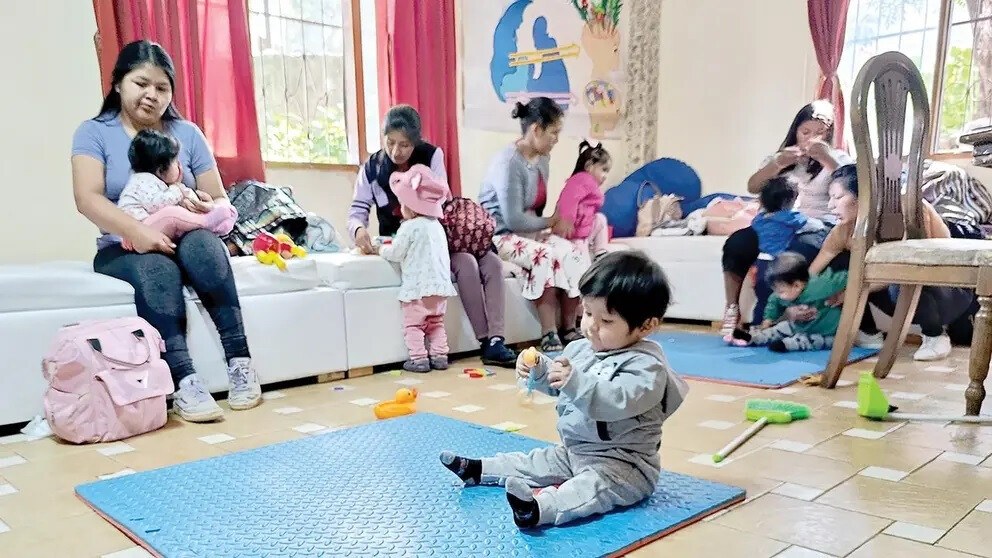
Famisal staff knows that motherhood is not "rosy" and accompanies mothers during the first 1,000 days of their children's lives, the most important for their development.
"Here they have taught me how to love a child," says Martha, a baby's mother, tearfully. How possible is this phrase? Can you teach love? The Healthy Families Foundation (Famisal), located in Chilimarca (Tiquipaya), has a multidisciplinary team capable of strengthening this emotional bond between mother and baby.
Martha found this space that, today, is unique in Bolivia: a "woman and child-friendly" house. But, compared to what they do there, this definition of that place falls short.
Famisal is a real mom school. It teaches everything from how to bathe a newborn to yoga to reduce stress in moms. Knowledge that brings visible results: babies with a highly developed brain structure.
"If we work from this stage, we will have good adults," says Adalberta Chinche, legal representative of Famisal, with complete certainty.
"The latest research in neuroscience tells us that the baby's highest learning curve occurs up to two years (...)," reinforces Nataly Coaquira, social worker at Famisal.
The members of this institution emphasize this to mothers, in order to get them involved in the optimal development of their children. "In these first thousand days, you will define what your baby will be like when they grow up."
Some mothers go in their free time, for others, this place is their refuge.
When mothers are here, we want them to get out of their routine, "to talk to their babies, to enjoy, to laugh, to sing to them, to cuddle them. That they have at least a little time for the two of them (mother and child)."
This positive attitude is then replicated at home, because it lowers their stress level, "the stress of carrying all the weight of household chores."
In total, Famisal will receive 60 mothers, starting in July 2024.
CONTEXT Chinche explains that the project arose from the absence of spaces where information of interest to mothers is shared. "Sometimes, in hospitals, doctors have many patients and cannot explain basic aspects of motherhood or child rearing."
It is in the face of this need that Famisal arose, "it is done as a self-help group." And it is that, while there are mothers who go to learn, others transmit their knowledge and, together, create a powerful network that mothers their children in the best possible way.
A mother shows a handmade rug for her son. / DAYANA FLORES
BOND The connection is very strong, more than usual, since they also teach mothers to materialize their love. For example, they make their own hands several stimulation tools, such as cards painted by them, to wool rugs. "Being able to do this for them is very satisfying. They say: 'this is mine and it's for my baby'. They generate a secure attachment," explains Chinche.
They punch each letter of their babies' names, spin their favorite drawings and, the end result, is an invaluable gift and a space for play and motor development for their little ones.
The foundation gives them all the material to create, wool, punch and others. They also make drums with recycled material: sensory dolls with disused socks that, if babies put them in their mouths, have nothing that can hurt them because they are made by the mother very safely," explains Chinche.
INTEGRITY In addition, Famisal cares about the health of mothers. It teaches recipes so that they can take advantage of each of the products they are given in the universal subsidy.
Even beauty is important to the foundation. Last week was dedicated to skin care and they put on masks. They also did yoga and Zumba.
"Feeling good made the treatment better with their children."
Famisal observes that many institutions promote non-violence, but forget to say what tools to give mothers so that they do not incur in it.
PLUS In addition, they work on the prevention of violence, since many of them suffer psychological and physical aggressions from their partners. "(...) What we want is that here they find a place that helps them to get ahead."
Chinche and her team make periodic home visits to promote communication between couples and try to involve parents and promote. "If I had known before, my life would have been different," says some male member of this group.
WORK The requirements to be part are the photocopy of the card and the SUS. Also, if they have children, their documents.
If they stay full time, they can enjoy a lunch that is very healthy. "The objective is to show mothers that there are new ways to eat" with chickpeas, lentils and other sources of protein to strengthen the development of their babies.
It is not that mothers do not want to eat these cereals, but some do not know how to prepare them. For example, chickpeas with bone, type k'allu.
At home they have to wash, cook and not take care of the baby. The ideal is that while eating the papaya, you should count the color of the papaya, which is a fruit, its flavor and, if there is also involvement of the father, "those babies vibrate."
[Copyright (c) Global Economic Times. All Rights Reserved.]






























